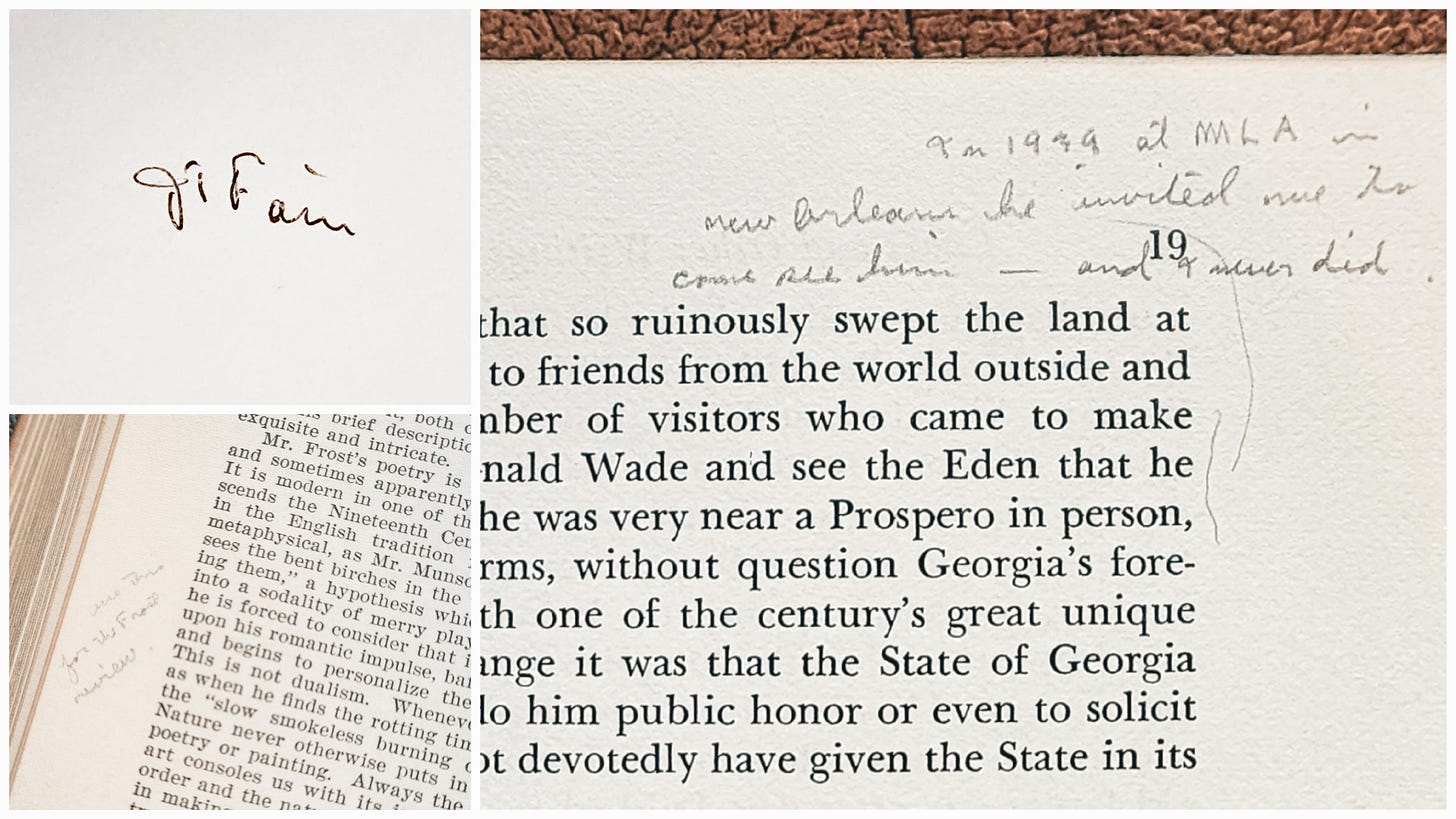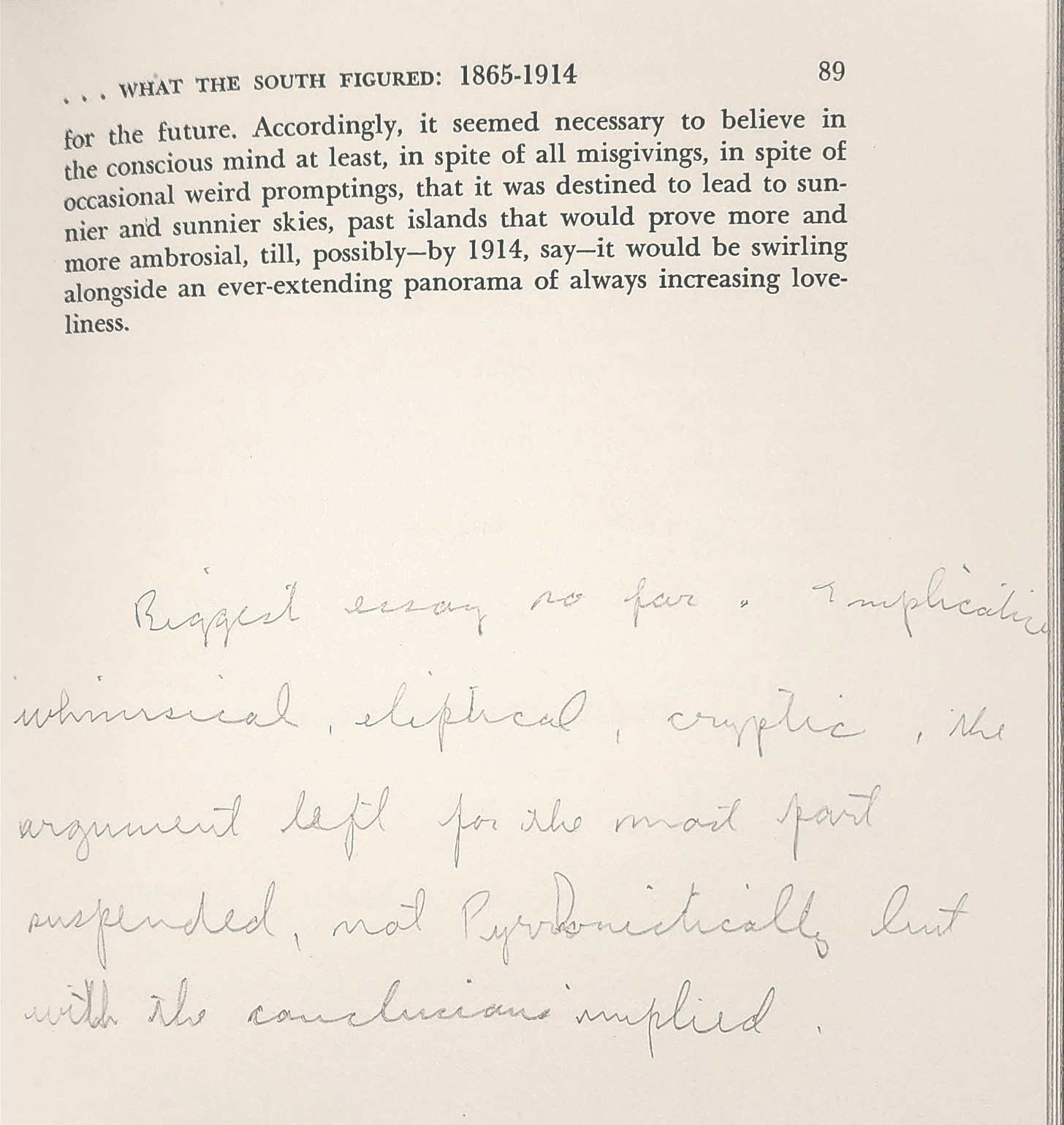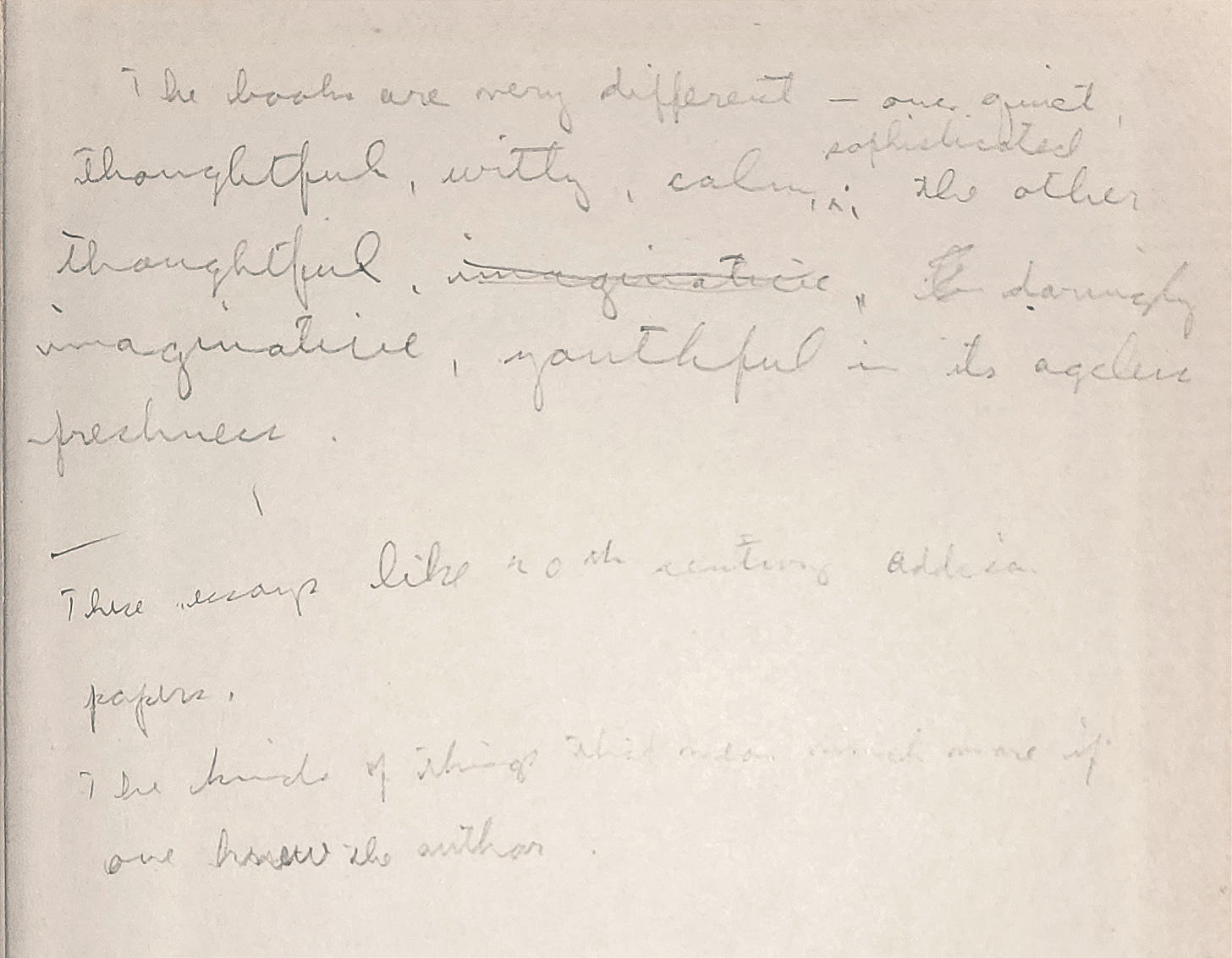From the Shelves: John Tyree Fain
The student of the Southern Agrarians, if he keeps at it long enough, will find himself circling the same names. “Fain and Young” is one such pairing, a bibliographic shorthand for The Literary Correspondence of Donald Davidson and Allen Tate, edited by John Tyree Fain and Thomas Daniel Young and published by the University of Georgia Press in 1974.
Why bring this up? I recently came into possession of two books from John Tyree Fain’s own shelf. His handwriting runs in the margins, and it seems fitting to pause over those pages and say a word for the man who left them.
The Young Man
John Tyree Fain, Jr. was born in December 1904 in Nashville. His father, though a businessman, took an active role in Tennessee’s historical organizations. He contributed to the Tennessee Historical Society, served with the Sons of the American Revolution, and authored the Critical and Analytical Index and Genealogical Guide to Ramsey's Annals of Tennessee.
Mr. Fain received his early education at Wallace University School in Nashville. In 1914, Donald Davidson briefly taught there. As Mark Royden Winchell records, Davidson was financially strained and accepted a position teaching English, German, and Biblical History to younger boys. Decades later, Davidson described his schedule:
My five-day-a-week schedule at Wallace University School called for me to teach from 8:00 a.m. to about 9:45 a.m. I would just have time to walk to my 10 o’clock Vanderbilt classes. Immediately after my 11–12 V. U. class—or, rather, after the required 12–12:30 chapel was over—I would get back to Wallace School, take a bowl of soup and a meagre sandwich at the very spartan Wallace lunch-room, then teach until 3 p.m. I managed somehow (I don’t remember how) to get in Chemistry Lab. I would take Dr. Mims’s and Curry’s late afternoon classes.1
Fain entered Vanderbilt in 1922, when the ink was still drying on the first Fugitive poems. Studying under John Crowe Ransom and Donald Davidson, sitting alongside Robert Penn Warren, Merrill Moore, and Andrew Nelson Lytle, He found himself aligned with a time and company that comes along only once. These formative experiences shaped his academic trajectory and editorial work, demonstrated in the Davidson-Tate correspondence and his work on The Spyglass, Views and Reviews, 1924-1930, a collection of Donald Davidson’s book reviews from The Tennessean book page, published by Vanderbilt University Press in 1963.
Though John Tyree Fain secured distinction in Victorian scholarship, particularly in his analysis of Ruskin's ethical economy,2 he remained rooted in the Southern intellectual inheritance of his youth.
His formal education culminated in a doctorate in English from Vanderbilt University in 1941, supplemented by periods of study at the University of Chicago and the University of Illinois. He worked in the textile industry in Rochelle, Illinois for a few years, and worked as an economist for the War Labor Board and the Federal Reserve Bank in Atlanta during World War II.
Of his time in Illinois, Fain wrote “Most of the so-called intelligentsia of those days were pink, some deep red. When I went up to graduate school at the University of Illinois in 1930, I was invited to a party given by a noted political science professor, and when I got there I discovered it was a Communist cell. I was not enthusiastic and was not invited again. Those boys [Southern Agrarians] who took their stand at that time knew what they were doing and they meant business.”3
The Florida Man
In 1947, he moved with his family to Gainesville, Florida, where he became a professor of English at the University of Florida, a position he would hold for many years. The following year Lytle joined the faculty, intent on founding a creative writing program. Harry Crews passed through there, too, and there are expensive books to prove it. Professor John Morefield, who came to Gainesville in 1962, remembers meeting Dr. Fain, then advising new graduate students. He describes him as “a lovely man—white hair, tie, seersucker jacket (practically a uniform for professors it seemed)—a Southern gentleman of the old school,” connected to Ransom, Lytle, Tate, and Warren. Morefield also recalls that Fain was working on The Spyglass at the time.4

In my research for this essay I found a particular treasure, a transcribed conversation with the 82-year-old John Tyree Fain dated Sunday, August 17, 1986, captured in his Gainesville home. This exchange, taking place a mere four months his death in December, preserves on paper Fain's final public thoughts on the Fugitive-Agrarian movement and his decades-long friendship with Andrew Lytle.5
In 1970, when the university granted Lytle an honorary Doctor of Letters, they selected Fain to deliver the presentation address at the school's first literary symposium. This gathering, which brought Cleanth Brooks, Peter Taylor, and John Crowe Ransom to campus, marked one of Ransom's final public appearances.
In the ledger of things that last, I reckon you’ll find Fain’s name due to his diligent scholarly inquiry, devoted attention to those students placed in his charge, and a continued allegiance to those Southern writers whose legacy he did not discard.
I reached out to Dr. James Everett Kibler asking if he’d known Dr. Fain. “I did not know him,” he said, “but I admire his work, done at a time when it probably hurt, not helped him in academia. I know from experience. Also, you can tell who's the devoted scholar when he works without the rewards.”
Winchell, Mark Royden. Where No Flag Flies: Donald Davidson and The Southern Resistance. University of Missouri Press, 2000.
Fain, John Tyree. Ruskin and the Economists. Vanderbilt University Press, 1956.
Fain, John Tyree. “Introduction of Andrew Lytle” Chattahoochee Review 01.1, 1981.
Morefield, John. “Caesar's Irregulars” The Christendom Review 1.1.
John Tyree Fain and Carl Griffin, “Conversation with John Fain” Chattahoochee Review 8.4, 1988.
Further Reading
You can find Fain’s work in The Victorians Newsletter, PMLA. Publications of the Modern Language Association of America, The Explicator, Shakespeare Quarterly, Southern Economic Journal.
Fain, John Tyree. “Fifty Years Have Come and Gone,” The Tennessean 1974-09-08 p. 86.
Fain, John Tyree. “Holly and Ivy,” Southern Folklore Quarterly 11.4, 1947.
Fain, John Tyree. “Marietta, Georgia: A Problem in Reconversion” Economic Review (Federal Reserve Bank of Atlanta) (October 31, 1945).
Fain, John Tyree. “Reconversion in Panama City” Economic Review (Federal Reserve Bank of Atlanta) (December 31, 1945).
Fain, John Tyree. “Redefining Research, Becoming A Better Reader”.
Fain, John Tyree. “Segments of Southern Renaissance,” South Atlantic Bulletin 36.3, 1971.









That transcribed conversation with Fain is a gem. Great find.